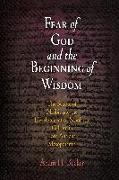Fear of God and the Beginning of Wisdom: The School of Nisibis and the Development of Scholastic Culture in Late Antique Mesopotamia
BücherAngebote / Angebote:
Fear of God and the Beginning of Wisdom
The School of Nisibis and the Development of Scholastic Culture in Late Antique Mesopotamia
Adam H. Becker
"Adam Becker brings together work in two different linguistic areas, Syriac and Greek, which are usually conducted separately. Since the period dealt with is a time of transition from the ancient to Medieval world, one of immense significance for the subsequent history of both the Middle East and Europe, it is particularly helpful to have a book that shows how these two geographical worlds were intimately linked from a cultural point of view prior to the political separation brought about by the Arab conquests in the seventh century."--Sebastian Brock, Oxford University
The School of Nisibis was the main intellectual center of the Church of the East in the sixth and early seventh centuries C.E. and an institution of learning unprecedented in antiquity. Fear of God and the Beginning of Wisdom provides a history both of the School and of the scholastic culture of the Church of the East more generally in the late antique and early Islamic periods. Adam H. Becker examines the ideological and intellectual backgrounds of the school movement and reassesses the evidence for the supposed predecessor of the School of Nisibis, the famed School of the Persians of Edessa. Furthermore, he argues that the East-Syrian ("Nestorian") school movement is better understood as an integral and at times contested part of the broader spectrum of East-Syrian monasticism.
Becker examines the East-Syrian culture of ritualized learning, which flourished at the same time and in the same place as the famed Babylonian Rabbinic academies. Jews and Christians in Mesopotamia developed similar institutions aimed at inculcating an identity in young males that defined them as beings endowed by their creator with the capacity to study. The East-Syrian schools are the most significant contemporary intellectual institutions immediately comparable to the Rabbinic academies, even as they served as the conduit for the transmission of Greek philosophical texts and ideas to Muslims in the early 'Abbasid period.
Adam H. Becker teaches classics and religious studies at New York University. He is coeditor, with Annette Yoshiko Reed, of The Ways that Never Parted: Jews and Christians from Late Antiquity to the Early Middle Ages.
Divinations: Rereading Late Ancient Religion
2006 | 320 pages | 6 x 9
ISBN 978-0-8122-3934-8 | Cloth | $69.95s | £45.50
ISBN 978-0-8122-0120-8 | Ebook | $69.95s | £45.50
World Rights | Religion, History
Short copy:
Since the period dealt with is a time of transition from the ancient to Medieval world, it is particularly helpful to have a book that shows how these two worlds were intimately linked from a cultural point of view prior to the political separation brought about by the Arab conquests in the seventh century."--Sebastian Brock, Oxford University
Folgt in ca. 15 Arbeitstagen
